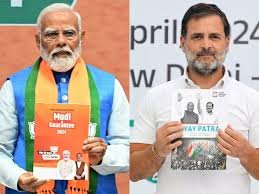NEW DELHI, April 17: From a few lines two decades ago to multiple full pages, Lok Sabha election manifestos of two primary national parties in India – the BJP and the Congress – reflect rising concerns over climate change and environmental degradation.
While policy experts have welcomed the increased attention to these issues, they, however, say many promises have proved to be “symbolic” considering the “contradictory” approach governments have taken in certain matters, including forest and wildlife conservation.
Election manifestos represent the political standing of parties and are often discussed, debated, and compared during elections. From international policy to jobs, health, and education, these address a range of issues and help the electorate make an effective decision.
The BJP, which released its 69-page election manifesto last Saturday, has dedicated three pages to environment and climate issues under the section “Modi Ki Guarantee for Sustainable Bharat”, coming a long way from just a paragraph on “environment” in the 1999 Lok Sabha elections.
The word “climate change” did not even figure in the 1999 and 2004 manifestos of the BJP, currently the world’s largest political party.
The Congress has allotted two pages for environment, climate, disaster management, and water and sanitation-related issues in its 2024 election manifesto.
A review of its previous Lok Sabha election manifestos shows a strong emphasis on climate change and environmental sustainability issues.
A 2022 study by the Centre for Policy Research noted that the Congress has consistently emphasized climate change and environmental sustainability over the last three elections and has discussed specific steps for environmental protection, like green budgeting and the creation of an independent authority to work on it.
According to the study, while the BJP dedicates about 11 per cent of its manifesto to environmental issues, left-leaning parties generally highlight water conservation, dedicating around 12 per cent of their content to environmental protection and sustainability.
Key commitments in the BJP’s latest manifesto include achieving net-zero emissions by 2070, transitioning to non-fossil fuel energy sources, improving river health, achieving national air quality standards in 60 cities, expanding tree cover, and boosting disaster resilience.
The Congress has proposed setting up a fund for a green transition and achieving the net-zero goal.
Experts, however, have expressed concerns regarding the lack of specific steps in their manifesto to address environmental challenges.
“The (BJP) manifesto does not reflect the issues that ecologists have been raising regarding environmental policies where larger reforms are required,” said Debadityo Sinha, a senior resident fellow at the Vidhi Centre for Legal Policy.
Sinha hoped the government would take steps to protect the existing natural forests and wildlife habitats, strengthen environmental laws, enhance the capacity of authorities, and ensure greater involvement of civil society in environmental decision-making.
Environmental activist and water policy expert Himanshu Thakkar said the UPA government did better when it comes to transparency in such matters compared to the NDA government.
He said the Congress government was responsive to civil society, which is the biggest advocate for environmental protection and sustainability.
“For example: The UPA listened to us and decided not to take up the Ken-Betwa River Interlinking Project which will completely destroy the Panna tiger reserve and large tracts of forests. The BJP government is suppressing the voices of dissent,” he claimed.
The river-interlinking project aims to transfer surplus water from the Ken river in Madhya Pradesh to Betwa in Uttar Pradesh to irrigate the drought-prone Bundelkhand region. Both Ken and Betwa are the tributaries of the Yamuna.
“The BJP government has not done anything noteworthy on ‘Namami Gange’; the Aravallis are in a disastrous state. If more of the past is going to happen in the future, it is not going to help,” Thakkar said.
Bhavreen Kandhari, an environmentalist working for better air quality in India, said while political parties have begun to acknowledge environmental issues, these concerns are often relegated to the lower sections of their manifestos.
“It’s crucial that environmental issues are not relegated to the bottom of the priority list, especially given the pressing concerns of air pollution and the climate crisis. This is particularly important as India is home to 83 of the 100 most polluted cities in the world. While their manifestos outline ambitious plans, the real test lies in the execution and governance, which requires strict enforcement of laws,” she said.
Environmentalists and policy experts have objected to the amendments made to the Forest Conservation Act which rendered a large tract of forests unprotected.
They say the Forest Conservation Rules brought in 2022 diluted the requirement of mandatory Gram Sabha consent before diverting forest land for non-forestry purposes.
“They (political parties) promise to increase the tree cover on one hand and destroy pristine forests such as the Hasdeo Aranya in Chhattisgarh for coal mining on the other. The central government diluted environmental and forest laws to help industries. This is contradictory,” Alok Shukla, convenor of the Chhattisgarh Bachao Andolan, said.
Parties make big promises and use lofty words, but this is not reflected in their actions, he added.
Despite gaining attention in elections, environmental issues remain secondary to livelihood concerns in the broader political discourse, experts say.
One reason for this, they say, is that political and social movements in India predominantly focus on livelihood issues. (PTI)












